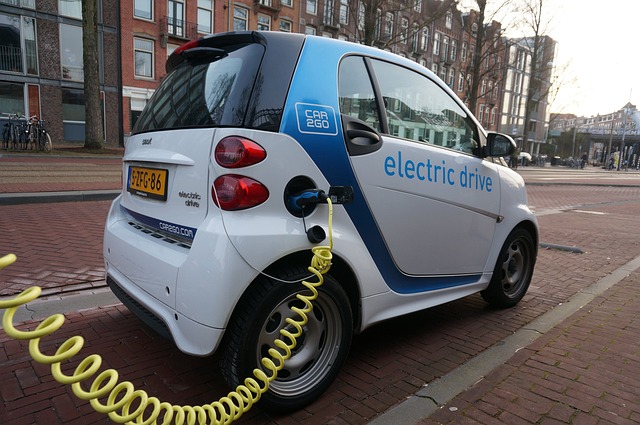The automotive industry is undergoing a green revolution, driven by leading manufacturers adopting electric vehicle (EV) technology and eco-friendly practices. Pioneers like Tesla offer advanced EVs, while brands like Volkswagen and Ford invest heavily in R&D. Hybrid cars provide a balance between sustainability and performance, and the market for Select Sustainable Vehicles is growing, catering to families, adventurers, and businesses with green fleet management strategies. The future looks electric, with zero-emission trucks and buses becoming more feasible. This vibrant tapestry of sustainable transportation solutions includes global giants and niche startups, all contributing to a greener world through various options like solar-powered chargers and fuel-efficient models under $20k. Consumer demand for eco-friendly vehicles is driving market growth and innovation.
Discover the leading brands revolutionizing green transportation with our comprehensive guide to the best Select Sustainable Vehicles. From top Electric Vehicle Manufacturers paving the way in zero-emission technology, to Hybrid Cars offering a balanced approach, and SUVs catering to families and adventurers, this article explores diverse options. We delve into the future of green with zero-emission trucks and buses, and analyze both global giants and niche players shaping the market driven by consumer trends towards sustainable vehicles.
- Top Electric Vehicle Manufacturers Leading the Green Revolution
- Hybrid Cars: A Balanced Approach to Eco-Friendly Driving
- Sustainable SUV Options for Families and Adventurers
- The Future of Green: Zero-Emission Trucks and Buses
- Global Giants vs. Niche Players: Exploring Diverse Green Brands
- Consumer Trends Shaping the Market for Sustainable Vehicles
Top Electric Vehicle Manufacturers Leading the Green Revolution

The green revolution in the automotive industry is being led by several manufacturers who are at the forefront of electric vehicle (EV) technology. These top players are not only shaping the future of sustainable transportation but also setting new standards for eco-friendly practices. When it comes to selecting a sustainable vehicle, these brands offer a range of options that cater to various needs and preferences. Tesla, an industry pioneer, has been at the vanguard, pushing the boundaries of EV performance and technology with models like the Model 3 and Model Y. Their advanced battery systems and supercharger network make long-distance travel more accessible for electric car owners.
Other notable manufacturers include Volkswagen, which has made significant strides in electrification with its ID series, and Ford, known for its popular Mustang Mach-E. These companies are not only producing environmentally friendly vehicles but also investing heavily in research and development to enhance battery technology, reduce production waste, and promote the use of biodegradable motor oils for eco-friendly driving. Additionally, some car parks now incorporate solar-powered systems for efficient energy utilization, while hybrid construction equipment is making waves in the building industry as a sustainable alternative.
Hybrid Cars: A Balanced Approach to Eco-Friendly Driving

Hybrid cars represent a balanced approach to eco-friendly driving, combining traditional internal combustion engines with electric motors and batteries. This technology offers significant fuel efficiency improvements while minimizing environmental impact, making them a popular choice for consumers who want to select sustainable vehicles. By leveraging both power sources, hybrids deliver reduced emissions and lower running costs, appealing to a broad spectrum of drivers, including those who prioritize performance and style without compromising on sustainability.
For responsible consumers looking for green sports cars or eco-friendly alternatives, many hybrid models offer dynamic driving experiences alongside improved fuel economy. Moreover, the use of biodegradable car parts is gaining traction in the industry as manufacturers strive to meet the growing demand for sustainable transportation options. This trend not only benefits the environment but also ensures that vehicles are designed with the future in mind, aligning with the needs of today’s conscious consumers and businesses adopting green fleet management strategies. Additionally, recycled tire tires are being incorporated into hybrid systems, providing long-lasting performance while reducing waste and further contributing to a circular economy.
Sustainable SUV Options for Families and Adventurers

For families and adventurers seeking a green alternative to traditional SUVs, there’s a growing array of excellent options to choose from. Many leading automotive brands are now offering electric cars for eco-conscious commuters who want a smooth ride with zero emissions. These vehicles not only provide powerful performance but also boast advanced safety features designed for peace of mind on the road.
Additionally, those involved in construction or outdoor activities can opt for hybrid construction equipment for eco-building projects. These machines combine gasoline and electric motors to reduce fuel consumption and lower carbon footprints without compromising productivity. Even the interiors of these sustainable SUVs are moving towards sustainability with recycled materials for automotive interiors, reflecting a commitment to minimizing waste throughout the production process.
The Future of Green: Zero-Emission Trucks and Buses

The future of green transportation is looking electric – quite literally! As we shift towards a more sustainable future, zero-emission trucks and buses are no longer a distant concept but an increasingly viable reality. These vehicles promise to revolutionize not just personal mobility but also commercial transport, reducing carbon footprints significantly. By embracing clean energy technologies, brands are paving the way for a greener, more eco-conscious world.
Choosing sustainable vehicles goes beyond cars; it encompasses the entire logistics chain. Consider the potential of switching to reusable water bottles for hydration on the go in fleet vehicles, or even exploring innovative solutions like sustainable shipping containers for cargo transport. Community car-sharing programs and hybrid construction equipment for eco-building are also part of this growing trend towards greener practices. With such advancements, we’re not just talking about a more environmentally friendly future; we’re actively shaping it, one vehicle at a time.
Global Giants vs. Niche Players: Exploring Diverse Green Brands

The landscape of green vehicles is a diverse one, featuring both global giants and niche players. Major automotive brands like Tesla have revolutionized the electric vehicle (EV) space with their advanced technologies and sleek designs, offering not just eco-conscious fleet vehicle choices but also luxurious driving experiences. On the other hand, smaller companies specialize in innovative solutions such as wind-powered yachts for luxurious sailing, catering to a different segment of environmentally conscious consumers.
This mix of established companies and specialized start-ups underscores the growing interest in reducing carbon footprints through sustainable transportation. For businesses looking to integrate green fleet management into their operations, there’s an array of options beyond traditional gas or diesel vehicles. From electric cars to hybrid SUVs to hydrogen fuel cell trucks, the market offers diverse choices that not only contribute to environmental preservation but also provide practical, cost-effective solutions for daily commuting and logistics.
Consumer Trends Shaping the Market for Sustainable Vehicles

In recent years, a significant shift in consumer trends has been observed, with an increasing number of people prioritizing sustainability when making purchasing decisions, especially in the automotive sector. This change is driving the market for green vehicles, pushing manufacturers to innovate and deliver more eco-friendly options. The demand for select sustainable vehicles, ranging from solar-powered chargers for electric vehicles to fuel-efficient hatchbacks under $20k, has been steadily rising.
This trend towards sustainability isn’t just about reducing emissions; it also extends to the materials used in automotive interiors. Consumers are now seeking vehicles with recycled and eco-friendly materials, contributing to a greener production process and reducing the environmental impact of the transportation sector. As these consumer preferences continue to shape the market, we can expect to see more advancements and alternatives that cater to the growing demand for sustainable mobility solutions.
In conclusion, the global shift towards sustainability in the automotive industry is evident through the diverse range of green vehicle brands available today. From top electric vehicle manufacturers leading the charge with innovative technology, to hybrid cars offering a balanced approach, and even sustainable SUV options for families and adventurers, there’s a vast array of choices for consumers seeking eco-friendly options. As we look towards the future, zero-emission trucks and buses are poised to revolutionize transportation further. When selecting sustainable vehicles, consumers play a crucial role in shaping the market by embracing these innovative brands, ultimately driving a greener future for all.



